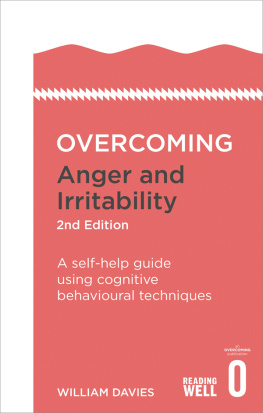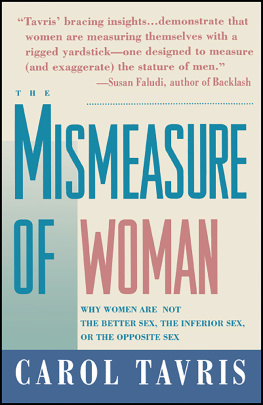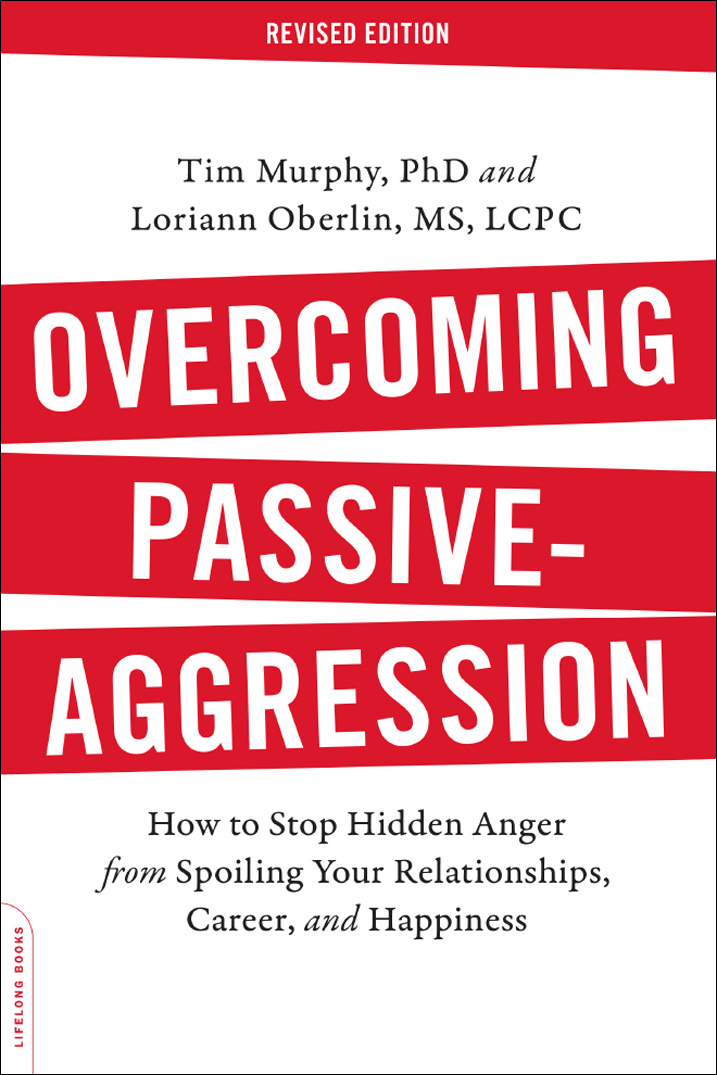Advance praise for Overcoming Passive-Aggression
Murphy and Oberlin have written a practical, straightforward book on overcoming hidden anger. Through the use of numerous real-life examples, they weave a path through the pain, stress, desire, and control that are associated with passive-aggression. They offer solid wisdom, guidance, and advice for uncovering it in family, school, and workplace relationships. Most importantly, they offer and discuss valuable tools for easing it in oneself and others, including mindfulness, forgiveness, laughter, praise, and effective listening. Written for both a lay and professional audience, readers will come back to this book time and again as a resource for managing their overall mental health and well being.
PAUL GIONFRIDDO, President and CEO, Mental Health America; author of Losing Tim: How Our Health and Education Systems Failed My Son with Schizophrenia
Chronically irritable, blaming, undermining, and downright toxic, the passive-aggressives concealed anger is destined to wreak havoc in relationships, in families, and on the job. Murphy and Oberlin shine the light of hope on this personality style and show readers the antidote to passive-resistance and malignant anger. This book is certain to be a game changer for passive-aggressive people, those who love them, and the mental health professionals who struggle to help them.
W. BRAD JOHNSON, PhD, author of Crazy Love: Dealing with Your Partners Problem Personality
This book shines the spotlight on passive-aggression, which lives below the radar. Well researched and loaded with up-to-date examples, practical strategies abound in this outstanding book.
JEFFREY BERNSTEIN, PhD, author of 10 Days to a Less Defiant Child
The revision of the excellent Overcoming Passive-Aggression is most welcome, providing a comprehensive understanding and coping strategies for passive faces of anger, while also addressing hostile and aggressive teens, intimate relationships, and passive anger that is threatening to children and divorce. I will continue to recommend this book to my angry patients with even more enthusiasm.
W. ROBERT NAY, PhD, author of Taking Charge of Anger, Second Edition
Tim Murphy and Loriann Oberlin have written an informative and lucid description of a prevalent and insidious psychological mechanism. Passive-aggression is maladaptive and detrimental, not just for the person manifesting this behavior but, for those toward whom it is directed. Understanding how to recognize, manage, and ultimately resolve such behaviors can be, not just therapeutic but, liberating.
JEFFREY LIEBERMAN, MD, Chair of Psychiatry, Columbia University College of Physicians and Surgeons; Psychiatrist in Chief, New York Presbyterian Hospital; past President, APA; author of Shrinks: The Untold Story of Psychiatry
Praise for the previous edition
Murphy, a psychologist and member of Congress, and Oberlin (coauthors of The Angry Child) closely examine how this kind of anger, called passive-aggressive, can undermine sufferers and their relationships and make life generally miserable.... While acknowledging the complexity of the problem, the work provides ample opportunity (and exercises) for personal growth regardless of whether you are on the giving or receiving end of passive aggression.
Publishers Weekly
Overcoming Passive-Aggression is not just a clear, concise description of a common problem; its an invaluable tool to help you deal with it.
MARGUERITE KELLY, family advice columnist for the Washington Post
... scientifically well-grounded, beautifully written, and eminently practical in its discussion of... the expression of anger, direct and hidden.
THEODORE MILLON, PhD, DSc, Professor of Psychiatry, Harvard University, author of Personality Disorders in Modern Life
Overcoming Passive-Aggression helps passive-aggressives deal with their hidden anger and offers their targets ways to cope and manage.
MARTIN KANTOR, MD, author of Passive-Aggression: A Guide for the Therapist, the Patient, and the Victim

Also by Tim Murphy and Loriann Oberlin
The Angry Child: Regaining Control
When Your Child Is Out of Control
Also by Loriann Oberlin
Surviving Separation and Divorce
Letting Go: Book One of The Maryland Shores
Second Chances: Book Two of The Maryland Shores (under pen name Lauren Monroe)

Many of the designations used by manufacturers and sellers to distinguish their products are claimed as trademarks. Where those designations appear in this book and Da Capo Press was aware of a trademark claim, the designations have been printed in initial capital letters.
Copyright 2016 by Tim Murphy and Loriann Hoff Oberlin
All rights reserved. No part of this publication may be reproduced, stored in a retrieval system, or transmitted, in any form or by any means, electronic, mechanical, photocopying, recording, or otherwise, without the prior written permission of the publisher. Printed in the United States of America. For information, address Da Capo Press, 44 Farnsworth Street, 3rd Floor, Boston, MA 02210.
Designed by Linda Mark
Set in 11 point Electra LT Std by Perseus Books
Cataloging-in-Publication data for this book is available from the Library of Congress.
Revised Da Capo Press edition 2016
ISBN: 978-0-7382-1919-6 (e-book)
Published by Da Capo Press, an imprint of Perseus Books, LLC, a subsidiary of Hachette Book Group, Inc.
www.dacapopress.com
Note: The information in this book is true and complete to the best of our knowledge. This book is intended only as an informative guide for those wishing to know more about health issues. In no way is this book intended to replace, countermand, or conflict with the advice given to you by your own physician. The ultimate decision concerning care should be made between you and your doctor. We strongly recommend you follow his or her advice. Information in this book is general and is offered with no guarantees on the part of the authors or Da Capo Press. The authors and publisher disclaim all liability in connection with the use of this book. The names and identifying details of people associated with events described in this book have been changed. Any similarity to actual persons is coincidental.
Da Capo Press books are available at special discounts for bulk purchases in the United States by corporations, institutions, and other organizations. For more information, please contact the Special Markets Department at the Perseus Books Group, 2300 Chestnut Street, Suite 200, Philadelphia, PA 19103, or call (800) 810-4145, ext. 5000, or e-mail .
10 9 8 7 6 5 4 3 2 1
About the Authors
TIM MURPHY earned his PhD from the University of Pittsburgh and has spent four decades as a psychologist and advocate for a better healthcare system. In January 2015, he began serving his seventh term in the US Congress, representing the 18th District of Pennsylvania. He is co-chair of the Mental Health Caucus, a founding member of the GOP Doctors Caucus, and chairs the Oversight and Investigations Subcommittee of the House Energy and Commerce Committee, which encompasses healthcare matters, food and drug safety, public health research, environmental quality, energy policy, and much more.













